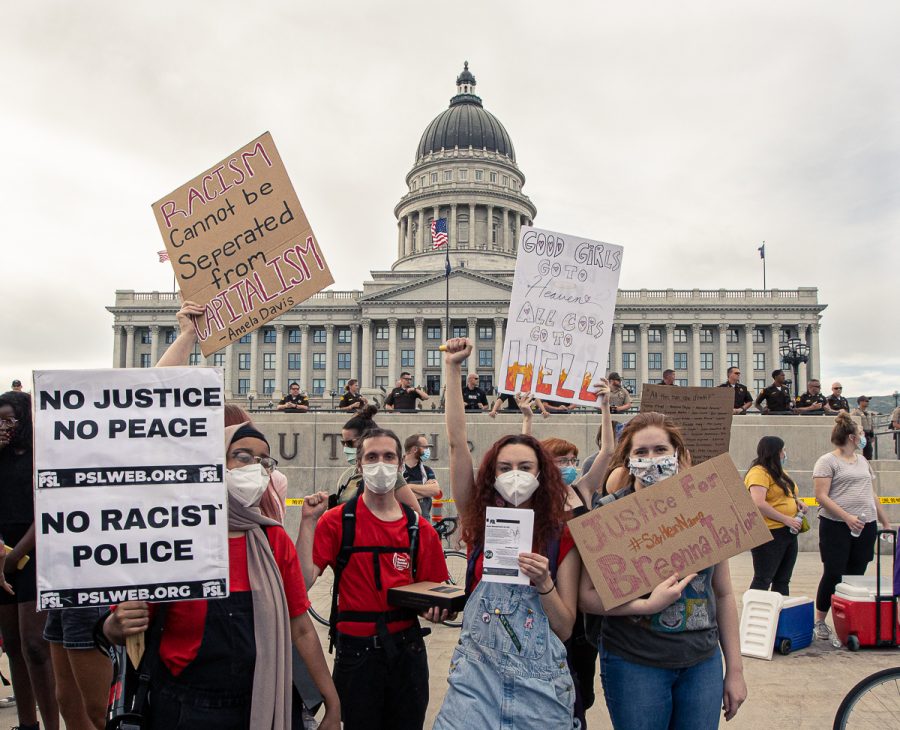Barron: How to Be an Ally as a White Student at the U
Anti-police protesters pose in front of the Utah State Capitol in Salt Lake City, Utah, on June 4, 2020. (Photo by Manasij Mukherjee | The Daily Utah Chronicle)
June 10, 2020
Since George Floyd’s murder at the hands of a white police officer late last month, many of us have shared posts on social media wanting to highlight injustice, show support for protests and elevate black voices – but are white allies like myself doing enough to address racial injustice in our community? The answer is typically no. Black advocates have criticized popular social media campaigns like #BlackoutTuesday as not only unhelpful but harmful to the Black Lives Matter (BLM) movement. To more effectively address racial injustice in our community, white University of Utah students need to educate themselves, demand institutional change locally and nationally and urge the U to commit to specific anti-racist work to protect Black, indigenous and people of color (BIPOC) on campus.
Taking time to listen and learn prior to advocating for racial justice is critical for white allies. Savala Trepczynski, the executive director of the Center for Social Justice at UC Berkeley School of Law, writes, “A white person rushing to do racial justice work without first understanding the impacts, uses and deceptions of their own whiteness is like an untrained person rushing into the ER to help the nurses and doctors.” Becoming educated, however, should not mean placing the burden of research onto BIPOC by asking them to showcase their trauma or tell us where to start. There are plenty of easily accessible resources online – from book lists to podcasts – focused on understanding privilege and its role in institutionalized racism. Even after gaining an understanding of their own privilege, white student allies should continue seeking out educational resources while working to further racial justice.
In response to George Floyd’s murder and the movement that has ensued, elected prosecutors from across the nation, including Salt Lake’s District Attorney Sim Gill, released a joint statement proposing 19 policy changes to help end “racially biased policing and police use of excessive force.” As demonstrated by the recently released video of Salt Lake police officers shooting Bernardo Palacios-Carbajal, police brutality is not just a greater American problem – the proposed policies endorsed by Gill must be implemented to protect Utahns. White student allies should email their local state representatives to encourage them to listen to BIPOC and work to implement proposed policies to protect Black lives in Utah.
To truly address racial injustice, institutional change must be implemented nationally. Lex Scott, the founder of the Utah chapter of BLM, has proposed a national police reform bill that will require all police departments to be overseen by democratically elected, independent civilian review boards; regulate body-cam footage release policies and increase de-escalation and implicit bias training for officers. According to Scott, this bill will help end the “vicious cycle” of injustice for victims of officer-involved shootings. White student allies should not only sign Scott’s petition, but also take a moment to email their congressional representatives and urge them to champion and support the bill.
Reading the University of Utah’s statement on George Floyd’s murder and the Salt Lake protests, I was disappointed by the university leadership’s failure to commit to specific anti-racist work to protect BIPOC on campus. Instead of choosing to “shape criminal justice reform, promote social justice and equity and address pervasive racism” themselves, the administration decided to leave those tasks to the state government and picked a more passive role for the U, to “support state leaders in their efforts.” Even the declaration by University of Utah Police Department Chief Rodney Chatman that police brutality will not be tolerated within the UUPD under his leadership will be meaningless after Chatman leaves the U. To encourage actionable and sustainable change on our campus, students should email President Ruth Watkins asking for policy that implicitly states that excessive force is a firing offense for UUPD officers, for a commitment to fund resources such as CESA and for an annual campus climate survey.
When discussing racial injustice, white people need to retire phrases like “I can’t believe this is still happening in 2020.” Ignorance of racial profiling and police brutality is a symptom of our privilege and our shock does nothing to protect black members of our community. Instead, white student allies need to utilize available resources to become better educated on racism and privilege and then join Black advocates in demanding institutional change and specific commitments to anti-racist work, starting at our own university.








